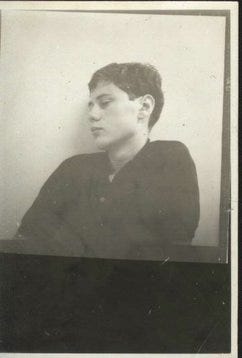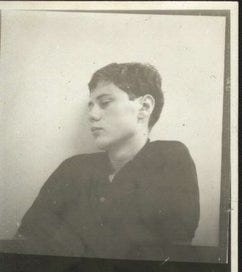
This is a picture of me when I was about 16.
This is a story I came across while cleaning up that I wrote about those troubled times, during the Wood Royal Commission a while back, where the bar Costello's was frequently mentioned. I was probably one of the only people in the Australian media who had even been there. It's all, I guess, about moral ambivalence. I wouldn't write this piece in the same way now; but this is what I wrote back then, and is pretty well happened.
I remember Costellos.
It was a place where as kids we could go to get off the street, get warm, get bought a drink, a feed, find somewhere to sleep for thenight. For many of us it wasn't the place of pedaristic evil that it is being daily painted in the media and the Police Royal Commission. In the very early 70s Costello's was one of the only places in the Cross where young people were welcome. While the evidence from some of the witnesses before the Commission may suggest that they were permanently psychologically damaged by what went on in the less public realms upstairs, how much of this derives from the impact on already disturbed adolescents of the stigma that was attached to homosexuality in those days is a moot point.
For a lot of us Costello's was one of the only places you could go to get off the street, away from the cops and the wierdos. They didn't have youth refuges in those days. There wasn't a queue of social workers waiting to help us. No one wanted to know. Our parents certainly didn't.
Going back home was never an option. And for many young kids I'm sure it isn't an option today. No - I don't support 12 year old kids being sexually abused. If there's one thing I hope to achieve in life it would be that my own children have a happier less emotionally distressed youth than I ever did. But let's get all this into some sort of perspective. Does anyone seriously expect us to believe that you can't buy 14, 15 or 16 year olds in Sydney in the nineties? That to this day an endless stream of sexually confused young men aren't coming in from often abusive homes in the suburbs, seeking adventure, affection, somewhere to sleep. And that most of them, like myself, go on to have careers, wives or lovers, children.
If I had to point to one thing that had scarred my life more than any other, it wouldn't be the number of queens who admired my young body. I don't know how my parents could have let me come home from school on Fridays, change outof my school uniform and come back in the early hours of Monday morning. Knowing what I know now, I wonder how they could have thrown me out tofend for myself within days of my 16th birthday. I remember, drunk as a skunk, standing at the top of William Street, and out of all the miserable chaos of that night one phrase from apasser-by: "He should be at home with his mother."
And around the same period, passing out literally in the gutter outside Circular Quay, blind drunk again. Out of all the hundreds of office workers bustling home to the North Shore, it was a gay man that picked me up and washed the vomit off me, let me have a shower at his house, gave me a change of clothes. It was gay men who encouraged me to finish my schooling bycorrespondence. Who taught me to appreciate music, books, conversation. Who encouraged my first stumbling efforts to write. Who, when I was homeless, sometimes for weeks on end, would give me shelter, food, clothes. Who in later years helped me through university when my own father wouldn't because only pinko communist poofs went to university.
Most of us came from pretty miserable home lives. We were utterly starved of affection. But there was always a queue of queens ready to take us home, buy us drinks, lavish us with attention, probably boast about us afterwards. They were often kind, they were often lonely, they were often alcoholic. A few kindly old souls I remember with affection to this day. People like old Hugh, a retired doctor in his 70s, long dead now, who treated us all as if we were his own children. Who was too much of a gentlemen to ever ask for sex. Oh no dear, I've already had one heart attack, he would say when we offered. Who listened to our problems, cared about us, gave us money and advice when we needed it.
A lot of young men around the Cross were very saddened by his death. For me, old Hugh was one of the first adult men who had ever actually caredabout me, who I was, what I was feeling; who I could go to for help, who was proud of me for trying to complete my education. In the end, who was using who? Costellos was one of Sydney's earliest gay bars, popping up at a timewhen gay pride and gay culture was entirely subterranean, when the sexuality of everyone there was illegal, when the upheavals of the sixties were only just starting to be felt in Australia and when the vast stupidity, ignorance and nastiness of the mainstream culture was something worth fighting against.
At the back of Costellos was the dance floor. At the front the bar. Ifyou were in any way different or remotely adventurous in Sydney in those days, sooner or later you would end up there. As someone who was there, raking over the coals of what happened in that bar more than 20 years ago strikes me as very odd. For everyone who was tormented, for whatever reasons, by their early sexual experiences, there are probably dozens of others that owe their present lives to our so-called predators, to the kindness of strangers.



